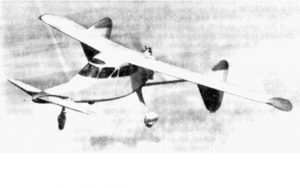MiG-8
The Mikoyan-Gurevich MiG-8 (Russian: Микоян и Гуревич МиГ-8 «Утка») was a Soviet experimental aircraft of 1945.
Nicknamed Utka (“duck”), as the word canard (referring to its small forward wings) is French for “Duck”, the MiG-8 was an experimental aircraft designed and funded exclusively by MiG OKB for testing a fixed-wing aircraft with a smaller forward surface and a main lifting surface aftwards on the fuselage. This design has benefits in a jet-powered aircraft as it leaves the rear of the fuselage clear of interference from the jet’s exhausts. To test the concept the MiG-8 was powered by a Shvetsov M-11 five cylinder radial engine, with a pusher propeller.
The aircraft was used as a testbed in developing the swept wing of the MiG-15, and afterwards continued to fly as communications/utility aircraft for the OKB.
Being made of wood and fabric, it was very light and reportedly a favorite among MiG OKB test pilots for its docile, slow-speed handling characteristics.
| MiG-8 Specification | ||
| Prime contractor: | Mikoyan-Gurevich Design Bureau | |
| Country of origin: | Soviet Union | |
| Function: | Experimental airplane | |
| Crew: | 1+2 passengers | |
| Year: | 1945 | |
| Power plant: | One 110 hp. M-11VM 5-cylinder air-cooled engine | |
| Dimensions | ||
| Wing span: | 31 ft. 2 in. | 9.5 m. |
| Length | 23 ft. | 7 m. |
| Height: | 8 ft. 2 in. | 2.5 m. |
| Weight: | ||
| Empty | 1,408 lb. | 640 kg. |
| Max. takeoff | 2,530 lb. | 1,150 kg. |
| Performance | ||
| Ceiling: | 17,056 ft. | 5,200 m. |
| Speed: | 127 mph. | 205 km/h. |
| Range: | 310 miles | 500 km. |
